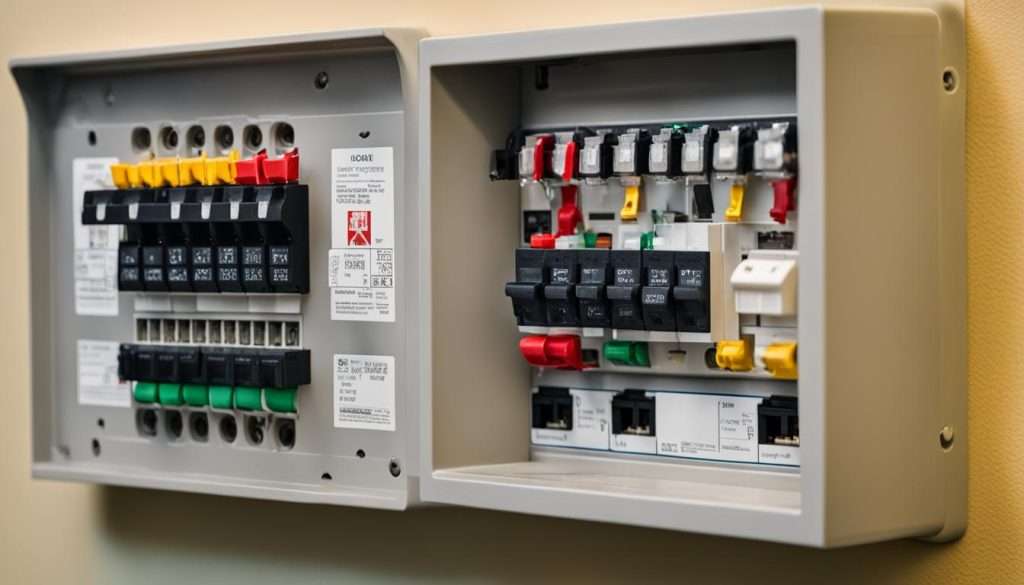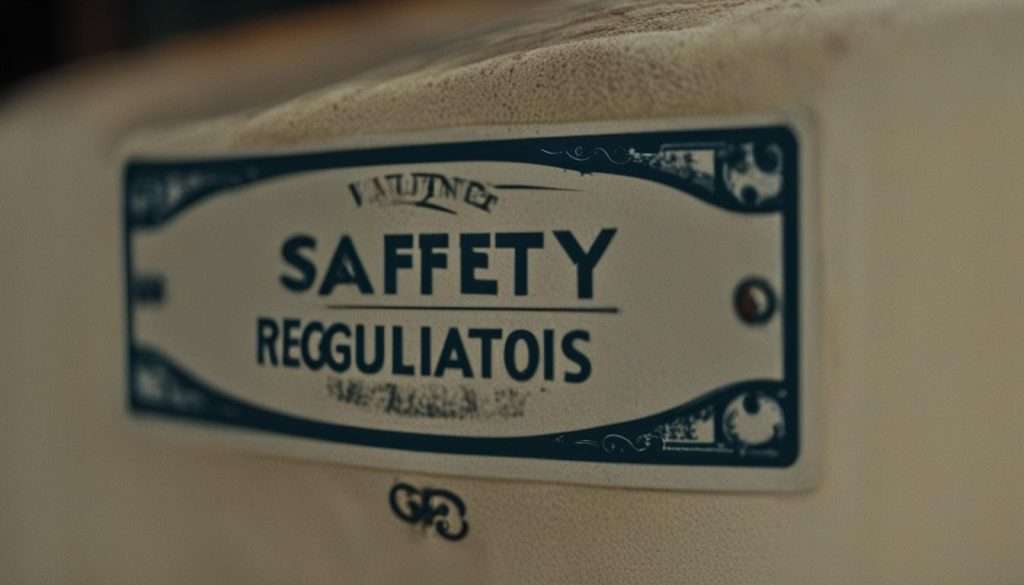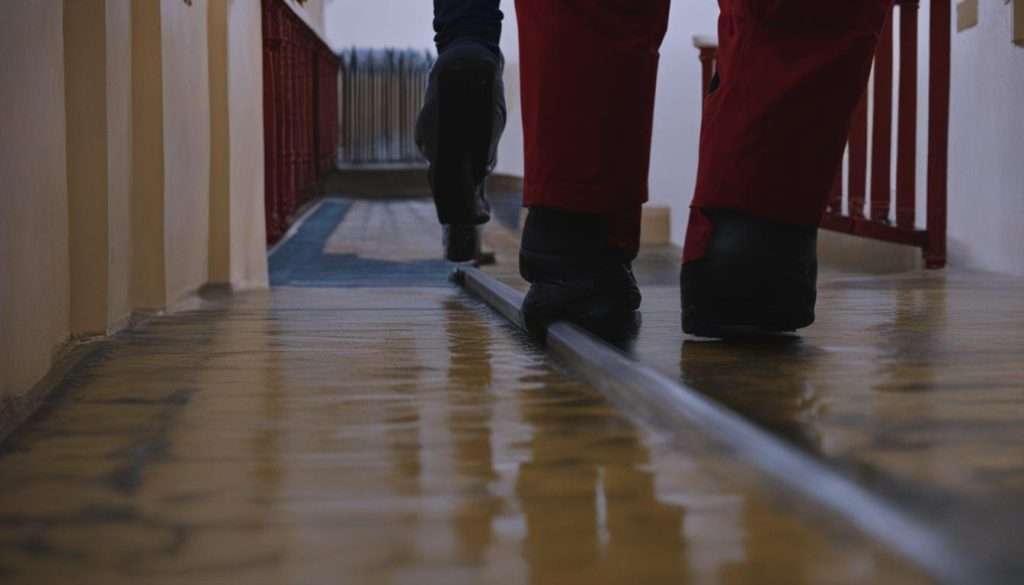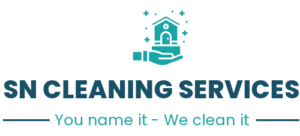Welcome to our comprehensive guide on holiday let safety and hygiene. As a responsible holiday let owner, it is vital to prioritize the safety of your guests while maintaining high standards of cleanliness. Not only does this ensure compliance with health and safety regulations, but it also contributes to guest satisfaction, leading to positive reviews and repeat bookings.
In this article, we will cover essential aspects of holiday let safety, including fire safety, gas safety, electrical safety, swimming pool and hot tub safety, furniture and furnishing safety regulations, carbon monoxide safety, preventing slips, trips, and falls, childproofing your holiday home, and storing cleaning products. We will provide you with practical tips and guidelines to help you create a safe and hygienic environment for your guests.
To kick off, let’s dive into the importance of fire safety in holiday lets. Remember, safety is paramount for a successful and fulfilling holiday experience.
Fire Safety for Holiday Lets
When it comes to ensuring the safety of your holiday rental, fire safety is of utmost importance. As a responsible holiday let owner, conducting a thorough fire risk assessment is a legal requirement. This assessment helps identify potential fire hazards and develop measures to reduce the risk.
To protect your guests, it is crucial to have smoke alarms installed on each floor of your holiday let. Smoke alarms should ideally be mains-wired with battery backups to ensure continuous functionality. Regularly test these alarms to ensure they are in proper working order and provide early warning in case of a fire.
In addition to smoke alarms, it is essential to equip your holiday let with fire extinguishers and fire blankets. These firefighting tools can prove invaluable in the event of a small fire, allowing your guests to take immediate action to minimize damage and ensure their safety. Make sure the fire extinguishers are easily accessible and that guests are aware of their location.
Fire Safety Checklist for Holiday Lets:
- Conduct a comprehensive fire risk assessment.
- Install smoke alarms on each floor, preferably mains-wired with battery backups.
- Regularly test smoke alarms to ensure they are functioning.
- Provide fire extinguishers and fire blankets in easily accessible locations.
- Develop an evacuation plan and communicate it to your guests.
By prioritizing fire safety in your holiday let, you can create a secure environment for your guests and ensure their peace of mind during their stay. Remember, prevention is key, so take proactive measures to minimize the risk of fire and equip your property with the necessary tools and resources for a safe and enjoyable vacation experience.
Gas Safety for Holiday Lets
When it comes to ensuring the safety of your holiday let, gas safety is of utmost importance. As a holiday let owner, you must comply with gas safety regulations to safeguard your guests and property. Conducting an annual gas safety check by a registered gas safe engineer is a legal requirement. This check encompasses not only the gas appliances but also the pipework and flues. It is essential to keep a record of this safety check for at least 2 years and provide clear instructions to guests on how to turn off the gas in case of an emergency.
Gas leaks can present a significant risk to the well-being of your guests and can even lead to serious accidents or explosions. Regular maintenance and inspections of gas appliances can help detect potential leaks and ensure their safe operation. By prioritizing gas safety, you are not only meeting your legal obligations but also providing peace of mind to your guests.
Gas Safety Tips for Holiday Let Owners:
- Conduct an annual gas safety check by a registered gas safe engineer.
- Keep a record of the gas safety check for at least 2 years.
- Provide clear instructions to guests on how to turn off the gas in case of an emergency.
- Maintain and inspect gas appliances regularly to detect potential leaks.
Why Gas Safety Matters:
Gas safety is crucial in holiday lets to protect both your guests and your property. Inadequate gas safety measures can lead to gas leaks, fires, or even carbon monoxide poisoning. By ensuring the proper maintenance of gas appliances and conducting regular safety checks, you can significantly reduce the risk of such incidents. Prioritizing gas safety not only enhances guest satisfaction but also demonstrates your commitment to providing a safe and enjoyable holiday experience.
Electrical Safety for Holiday Lets
Ensuring the electrical safety of your holiday let is crucial for the well-being of your guests. Compliance with electrical safety regulations is not only a legal requirement but also vital for preventing accidents and maintaining a high standard of guest satisfaction. Here are some key measures to consider:
1. Electrical Safety Compliance
- As a holiday let owner, it is essential to ensure that all electrical installations and appliances in your property comply with safety standards. This includes regular inspections and testing to identify any potential issues.
- Commissioning a Periodic Inspection Report at least once every 5 years is highly recommended. This report provides a thorough assessment of the property’s electrical systems and highlights any necessary repairs or upgrades.
- Additionally, visual inspections should be carried out before each let to check for any visible faults, such as frayed cables or loose sockets.
2. PAT Testing
- Portable electrical appliances, such as televisions, kettles, and hairdryers, should undergo Portable Appliance Testing (PAT) annually. This testing ensures that the appliances are safe to use and free from any electrical faults.
- PAT testing involves a series of checks, including visual inspections, earth continuity testing, and insulation resistance testing. It provides peace of mind for both you and your guests.
3. Providing Operating Instructions
Guests should be provided with clear and concise operating instructions for all electrical equipment in the holiday home. This includes details on how to operate appliances safely, where to locate fuse boxes, and what to do in case of an electrical emergency.
By prioritizing electrical safety and compliance in your holiday let, you can create a secure and enjoyable environment for your guests. Regular inspections, testing, and providing operating instructions are essential steps towards maintaining a high standard of safety. Remember, a safe holiday rental not only protects your guests but also enhances your reputation as a responsible host.

Ensuring Safety in Swimming Pools and Hot Tubs
When it comes to holiday rentals with swimming pools and hot tubs, safety should be a top priority. Implementing proper safety measures not only protects your guests but also gives them peace of mind during their stay. To ensure swimming pool safety, it is crucial to conduct a thorough risk assessment. This assessment, which should be carried out by a professional, helps identify any potential hazards and allows you to take appropriate action to mitigate them.
One essential safety measure for swimming pools is installing fences. These should be sturdy and meet the necessary height requirements to prevent unauthorized access, especially for young children. Clear signage should be displayed to indicate important safety guidelines, such as no diving or running near the pool. Additionally, providing safety equipment such as life hooks and rings ensures that guests have the necessary tools in case of an emergency.
In the case of hot tubs, safety guidelines should also be clearly communicated. Guests should be informed of the maximum occupancy and advised on the safe operation of the hot tub. Non-slip surfaces around the hot tub area can help prevent accidents caused by slippery surfaces. Regular checks and maintenance should be conducted to ensure the hot tub is in proper working condition, including monitoring water temperature and chemical levels.
Key points:
- Conduct a risk assessment for swimming pools and hot tubs
- Install sturdy fences and display clear safety guidelines
- Provide safety equipment such as life hooks and rings
- Communicate hot tub safety guidelines to guests
- Maintain non-slip surfaces and regularly check hot tub functionality
Furniture and Furnishing Safety Regulations
When it comes to ensuring the safety and well-being of guests in your holiday let, adhering to furniture and furnishing safety regulations is of utmost importance. The Furniture and Furnishings (Fire) (Safety) Regulations 1988 outline specific guidelines that must be followed to minimize the risk of fire-related incidents.
Fire Safety Standards
Under these regulations, all furniture, whether new or second-hand, must meet certain fire safety standards. This includes passing flammability tests and having a manufacturer’s label indicating compliance. It is essential to thoroughly inspect all furniture in your holiday rental and ensure it is fire safe. This not only protects your guests but also safeguards your property from potential damage.
Regular Inspections
Periodic inspections should be conducted to assess the condition of furniture and furnishings. Check for any signs of wear and tear, as damaged or worn-out items can pose a higher risk of fire hazards. If you discover any furniture that does not meet the required safety standards, it is crucial to replace it promptly.
Minimizing Fire Hazards
In addition to complying with furniture and furnishing safety regulations, there are other measures you can take to further enhance fire safety in your holiday let. Install smoke alarms on every floor, preferably mains-wired with battery backups, and regularly test them to ensure they are in working order. Educate your guests about fire safety procedures and provide clear evacuation instructions in case of an emergency.

By prioritizing furniture and furnishing safety regulations and implementing appropriate fire safety measures, you can create a secure and enjoyable environment for your guests. Remember, a well-maintained and fire-safe holiday rental not only enhances guest satisfaction but also protects your investment in the long run.
Carbon Monoxide Safety in Holiday Lets
When it comes to ensuring the safety of your guests in holiday rentals, carbon monoxide (CO) safety should be a top priority. Carbon monoxide is a silent killer, as it is odorless and invisible, making it difficult to detect without proper precautions in place. As a holiday let owner, it is crucial to install carbon monoxide detectors in all rooms with carbon-fueled appliances, such as fires, boilers, ovens, and heaters. These detectors act as early warning systems, alerting both you and your guests to the presence of this deadly gas.
Regularly test the carbon monoxide alarms to ensure they are in good working order and provide clear instructions to your guests regarding the safe operation of the appliances in your holiday let. Additionally, it is important to have these appliances regularly maintained and serviced by qualified professionals to minimize the risk of leaks and malfunctions. By taking these precautions, you can ensure that your guests are protected from the dangers posed by carbon monoxide.
Key Points:
- Install carbon monoxide detectors in rooms with carbon-fueled appliances.
- Test the detectors regularly to ensure they are functioning properly.
- Provide clear instructions to guests on the safe operation of appliances.
- Regularly maintain and service carbon-fueled appliances to prevent leaks and malfunctions.
By prioritizing carbon monoxide safety in your holiday let, you can create a safe and secure environment for your guests, giving them peace of mind during their stay.
Preventing Slips, Trips, and Falls in Holiday Rentals
One of the key aspects of ensuring a safe holiday rental is to prevent slips, trips, and falls. These accidents are all too common and can result in injuries to your guests. By taking proactive measures to identify and eliminate potential hazards, you can significantly reduce the risk of accidents and ensure a safe environment for your guests to enjoy their stay.
Identifying Slip Hazards
Regular floor inspections are essential to identify and address slip hazards. Inspect all flooring surfaces, including tiles, carpets, and rugs, for any signs of wear, damage, or loose edges. Repair or replace any damaged flooring promptly to eliminate potential tripping hazards. Additionally, be mindful of slippery surfaces in high-risk areas such as bathrooms and kitchens. It is crucial to provide non-slip mats in these areas to enhance traction and minimize the risk of accidents.
Eliminating Trip Hazards
Trip hazards can be found throughout a holiday rental, including loose wires, cluttered walkways, and uneven flooring. Take the time to secure loose wires and cables, ensuring they are safely tucked away and out of the way of foot traffic. Keep walkways clear of any obstacles, such as furniture or decorative items, to provide unobstructed paths for guests. If you identify any areas with uneven flooring, consider using warning signs or installing ramps to ensure the safety of your guests.
Promoting Fall Prevention
Preventing falls in your holiday rental is crucial. Adequate lighting is essential, particularly in staircases, hallways, and outdoor areas, to provide clear visibility and prevent accidental falls. Install sturdy handrails along staircases to provide support and stability for guests. Additionally, ensure that any outdoor walkways, steps, or ramps are free from debris, well-maintained, and properly illuminated to minimize the risk of falls, especially during nighttime.
By regularly inspecting your holiday rental for slip hazards, eliminating trip hazards, and promoting fall prevention, you can create a safe environment that prioritizes the well-being of your guests. Taking these precautions will not only reduce the risk of accidents but also contribute to a positive guest experience, ensuring their satisfaction and the success of your holiday rental business.

Childproofing Your Holiday Home
When it comes to the safety of young children in your holiday home, it is essential to take the necessary precautions to minimize potential risks and accidents. By childproofing your property, you can create a safe and secure environment for families with young children to enjoy their vacation.
Here are some key steps you can take to childproof your holiday home:
- Install baby gates: Place safety gates at the top and bottom of staircases to prevent young children from accessing potentially hazardous areas.
- Baby-proof cupboards: Fit childproof locks or catches on cupboards and drawers to keep cleaning products, sharp objects, and other dangerous items out of reach.
- Secure furniture and appliances: Anchor heavy furniture such as bookshelves and TVs to the wall to prevent tip-overs. Use childproof covers for electrical outlets and secure loose cables and cords.
- Store away hazards: Safely store small objects, choking hazards, and breakable items in locked cabinets or high shelves.
Additionally, if you provide a highchair for your guests, ensure it is sturdy, has safety straps, and meets relevant safety standards. Regularly inspect and maintain the highchair to ensure it remains in good condition and free from any defects.
By implementing these childproofing measures, you can create a safe and child-friendly environment in your holiday home, giving families peace of mind during their stay.
Storing Cleaning Products and Ensuring Oil Safety
In addition to ensuring the safety and hygiene of your holiday rental, it is crucial to pay attention to the storage of cleaning products and the maintenance of oil appliances. These aspects contribute to the overall safety of your property and reduce the risk of accidents.
When it comes to storing cleaning products, it is essential to complete a COSHH assessment. This assessment helps identify any potential risks associated with the use of cleaning chemicals and enables you to take necessary precautions. Safely store cleaning products in a locked cupboard and keep them out of reach of children to prevent accidental ingestion or misuse.
For holiday cottages that use heating oil, regular inspections by an OFTEC registered technician are recommended. These inspections ensure the safety of oil appliances and help prevent oil leaks, which can pose slip hazards. Taking proactive measures to address potential oil spills or leaks will help maintain the overall safety of your property.
By paying attention to the storage of cleaning products and conducting regular oil appliance inspections, you can enhance the safety standards of your holiday rental and provide a secure environment for your guests.
